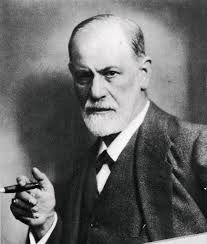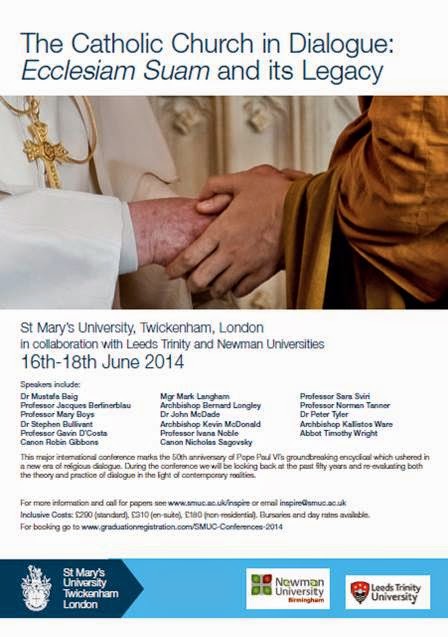
Yesterday I had the privilege of giving some lectures at the London Centre for Spirituality as part of my current 'Pursuit of the Soul'. We had some lively conversations so I didn't cover everything I had prepared. Here is a part I omitted, for those who were there yesterday, and to give a flavour to those who weren't there. It seems I am on the trail of Merton right now! I have some more news about our Catholic Dialogue Conference in June which I will be posting shortly... watch this space!
Best wishes
Peter
Freud, the ‘godless
Jew’, may not have been a militant atheist but the mental map he developed is
essentially a godless one. There is no room for the transcendent in Freud’s
schema and it would prove to him and his followers at best a distraction and at
worst a hindrance to good mental functioning. It is perfectly possible to
follow all the ideas of the object relations school without any place for the
transcendent. Freud himself vacillated during his life from being actively
opposed to the transcendent to seeing it as an irrelevance. The key aspect for
good mental functioning was appropriate ego strength and an ability to be open
to the ‘unknown thing’ with a listening ear to its demands.

When we survey the current practice of
spiritual direction in the West, and indeed much writing on Christian
spirituality, one of the most surprising things is the extent to which so many
Christian writers take the paraphernalia of Freudian analysis and apply it
unthinkingly to the Christian position. As Freudian language became widespread
in the mid-twentieth century so Christian writers, at first sceptical, adapted
it to their musings. A good example of this is the twentieth century Trappist
monk and social activist, Thomas Merton (1915 – 1968).
As a young man wanting to reject Christian
values Merton had turned towards psychoanalysis. At this point he saw analysis
as offering an opportunity to ‘indulge the appetites’:
I, whose chief trouble was that my soul and
all its faculties were going to seed because there was nothing to control my
appetites – and they were pouring themselves out in an incoherent riot of
undirected passion - came to the
conclusion that the cause of all my unhappiness was sex-repression! ( Merton
1948:124)
This quote comes from the Seven Storey Mountain, his
best-selling autobiography published in 1948 and charting his journey from
pre-war hipster to post-war monk. In it he is censorious about
psychological analysis and suggests ‘if I ever had gone crazy, I think
psychoanalysis would have been the one thing chiefly responsible for it.’ This
sense of mistrust towards analysis is typical of the time.
However, as he continued to live at the
Trappist monastery of Gethsemani in Kentucky, coming into increasing conflict
with his abbot, Dom James Fox, and wondering if the Cistercian vocation was
right for him afterall, he became increasingly interested in psychoanalysis.
Prompted by meetings with the psychiatrist Gregory Zilboorg he began to take
this element of the personality more seriously so that by the time he was
addressing his conferences to novices in the abbey in the 1960s he begins to
use a lot of psychological, and Freudian terms. He also became increasingly
interested in types of what we would today call ‘transpersonal psychology’ that
took the spiritual life seriously and sought to integrate it into psychological
development to which we shall return at the end of this chapter.
Of all Christian writers in the latter half
of the twentieth century interested in Christian spiritual direction, Merton is
something of a pioneer. Although flawed, his last books reveal an attempt to
integrate the findings of psychological analysis with spiritual insight. In Contemplative
Prayer, for
example, the integration of the two is almost seamless and he writes with
mastery of the spiritual life using tropes from the early Desert fathers, John
of the Cross and metaphors from Freud such as ‘the ego’ and ‘the unconscious’
with ease:
The ‘flame’ of which St John of the Cross is
speaking is a true awareness that one has died and risen in Christ. It is an
experience of mystical renewal, an inner
transformation brought about entirely by the power of God’s merciful
love, implying the ‘death’ of the self-centred and self-sufficient ego and the
appearance of a new and liberated self who lives and acts ‘in the Spirit’.
(1973:110)
In this respect these later writings come close to the ideal of
psychological language as ‘mystical discourse’ which I am presenting here. The
only problem with such appropriation is that it can tend to blur the original
significance of the terms for a writer such as Freud: a significance we have
described in this chapter. For Merton, the psychological tropes of Freud
offered a means of examining his life as a ‘reintegration of the self in
Christ’ through the marriage of different poles of the self. Merton, living
from the unconscious as a young man embraces the hard ethical demands of the
Christian life when he enters Gethsemani. Only with age and experience does he
realise that the hard edges of ego-control have to be surrendered to allow a
softer entrance of the spirit into all aspects of the self, bringing about what
Blake, his great inspiration, calls the ‘marriage of heaven and earth’. This is
far from the inner psychic conflict that Freud imagined and points more to
influence of his one time collaborator and student, Carl Gustav Jung.













